陈述句变特殊疑问句
陈述句改为特殊疑问句例子
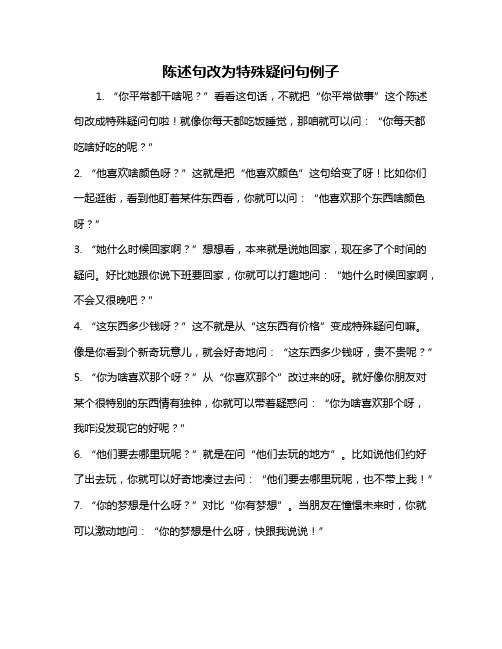
陈述句改为特殊疑问句例子
1. “你平常都干啥呢?”看看这句话,不就把“你平常做事”这个陈述句改成特殊疑问句啦!就像你每天都吃饭睡觉,那咱就可以问:“你每天都吃啥好吃的呢?”
2. “他喜欢啥颜色呀?”这就是把“他喜欢颜色”这句给变了呀!比如你们一起逛街,看到他盯着某件东西看,你就可以问:“他喜欢那个东西啥颜色呀?”
3. “她什么时候回家啊?”想想看,本来就是说她回家,现在多了个时间的疑问。
好比她跟你说下班要回家,你就可以打趣地问:“她什么时候回家啊,不会又很晚吧?”
4. “这东西多少钱呀?”这不就是从“这东西有价格”变成特殊疑问句嘛。
像是你看到个新奇玩意儿,就会好奇地问:“这东西多少钱呀,贵不贵呢?”
5. “你为啥喜欢那个呀?”从“你喜欢那个”改过来的呀。
就好像你朋友对某个很特别的东西情有独钟,你就可以带着疑惑问:“你为啥喜欢那个呀,我咋没发现它的好呢?”
6. “他们要去哪里玩呢?”就是在问“他们去玩的地方”。
比如说他们约好了出去玩,你就可以好奇地凑过去问:“他们要去哪里玩呢,也不带上我!”
7. “你的梦想是什么呀?”对比“你有梦想”。
当朋友在憧憬未来时,你就可以激动地问:“你的梦想是什么呀,快跟我说说!”
我的观点结论:把陈述句改成特殊疑问句其实很简单也很有趣啊,在生活中多问问这些问题,会让交流变得更有意思呢!。
小学四年级陈述句变特殊疑问句(含练习及答案)
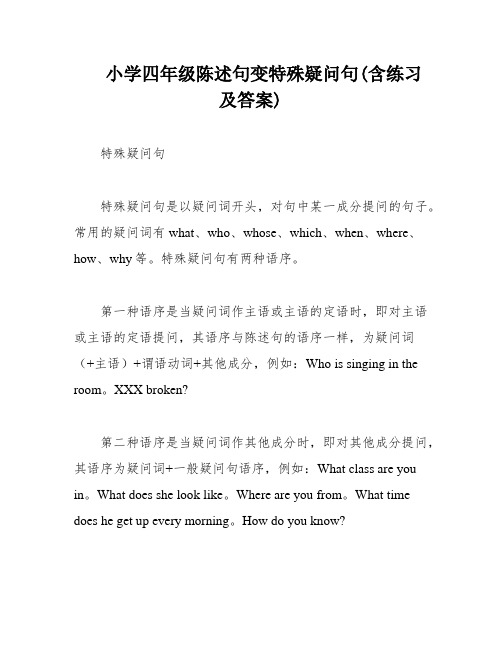
小学四年级陈述句变特殊疑问句(含练习及答案)特殊疑问句特殊疑问句是以疑问词开头,对句中某一成分提问的句子。
常用的疑问词有what、who、whose、which、when、where、how、why等。
特殊疑问句有两种语序。
第一种语序是当疑问词作主语或主语的定语时,即对主语或主语的定语提问,其语序与陈述句的语序一样,为疑问词(+主语)+谓语动词+其他成分,例如:Who is singing in the room。
XXX broken?第二种语序是当疑问词作其他成分时,即对其他成分提问,其语序为疑问词+一般疑问句语序,例如:What class are you in。
What does she look like。
Where are you from。
What time does he get up every morning。
How do you know?在特殊疑问句中,还有一些特殊的语法结构。
例如,特殊疑问词+助动词+主语+动词原形+其他,例如:Where do you study English。
特殊疑问词+be动词+主语+其他,例如:Whyis your Mum so angry。
特殊疑问词+情态动词+主语+动词原形+其他,例如:What can I do for you?需要注意的是,在回答特殊疑问句时,不能简单地用yes/no来回答,而应该具体回答问题。
例如,当问到Who is from Canada?时,回答应该是XXX。
当问到Where's XXX?时,回答应该是Near the XXX。
当问到Why do you like koalas?时,回答应该是Because they are cute。
在将肯定句变成特殊疑问句时,需要分三步骤。
首先变成一般疑问句,然后找到合适的特殊疑问词代替划线部分,最后将特殊疑问词提前放到句首,并大写,其余按顺序照抄,省略划线部分。
需要注意的是,如果问的是主语或主语的定语时,语序不变,为"特殊疑问词(+主语)+陈述句"。
陈述句变特殊疑问句的步骤
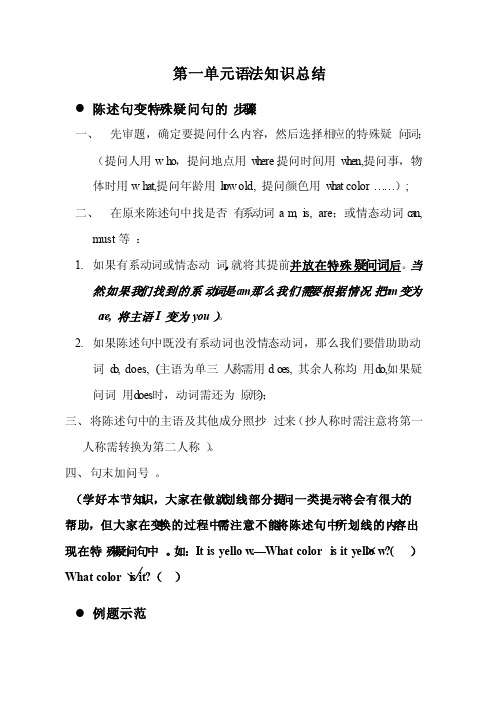
第一单元语法知识总结●陈述句变特殊疑问句的步骤一、先审题,确定要提问什么内容,然后选择相应的特殊疑问词;(提问人用wh o,提问地点用w h ere,提问时间用w h en,提问事,物体时用wh at,提问年龄用h ow old, 提问颜色用w h at color……); 二、在原来陈述句中找是否有系动词am, is, are;或情态动词c a n,must等:1.如果有系动词或情态动词,就将其提前并放在特殊疑问词后。
当然如果我们找到的系动词是am那么我们需要根据情况把a m变为a r e, 将主语I 变为you)。
2.如果陈述句中既没有系动词也没情态动词,那么我们要借助助动词d o, does, (主语为单三人称需用do e s, 其余人称均用d o,如果疑问词用d oes时,动词需还为原形);三、将陈述句中的主语及其他成分照抄过来(抄人称时需注意将第一人称需转换为第二人称)。
四、句末加问号。
(学好本节知识,大家在做就划线部分提问一类提示将会有很大的帮助,但大家在变换的过程中需注意不能将陈述句中所划线的内容出现在特殊疑问句中。
如:It is yellow.—What color i s it yellow?( )What color i s it?()●例题示范He is a nice man.----- Who is a nice man?His favori te color is red. ----What is his favori te color?She likespink best. ----What color does she like best?My father always goes to Americ a by plane.---- How does your father go to Americ a?练兵场-----就划线部分提问1.I am 10 years old.2.My mother likes rabbit(兔子).3.Lily comes from Canada.4.They go to school at 6:30 everymornin g.5.Sarahoftenread books on Saturd ay.6.We oftengo to Bei Jing for holiday(去度假)。
三、陈述句变特殊疑问句

初中基础语法——句型转换三、陈述句变特殊疑问句一、定义以特殊疑问词开头,对句中某一成分提问的句子叫特殊疑问句。
对应题型:对划线部分进行提问二、常用的疑问词疑问代词:what,who,which,whose,whom疑问副词:when,where,why,how疑问形容词:what(which,whose)+名词三、特殊疑问句的两种语序1.疑问词作主语或主语的定语,即对主语或主语的定语提问,其语序是陈述句语序:疑问词(+主语)+谓语动词+其他成分。
如:Who is singing in the room﹖whose bike is broken﹖2.疑问词作其他成分,即对其他成分提问,其语序是:疑问词+一般疑问句语序?如:What class are you in﹖What does she look like﹖Where are you from﹖What time does he get up every morning﹖How do you know﹖四、变换规则1、在一般疑问句的基础上,句首添加一个疑问词即可,可根据划线部分确定是什么疑问词。
2、接着找be动词或can,shall,will等放在疑问词后面,若没有则请助动词do/does/did帮忙,写在疑问词后面,how many除外,必须先写物品,再写be动词等。
3、划线部分去掉后剩下的内容照抄,(some 改成any,my改成your等)4、句点改成问号。
例题:对地点提问:whereThe baseball is under the table.__________ _________ the baseball?对姓名提问:whatHis name is Tony._________ is ________ name?Her name is Lucy Brown_________ her ______ name?对颜色提问:what colorMy jacket is blue.________ _________ is your jacket?对价格提问:how muchThe blue sweater is seven dollars________ _________ is the sweater?The pants are 25yuan.________ _________ __________ the pants.对生日提问:whenMy birthday is November 11th.________ __________ your birthday?对年龄提问:how oldShe is twelve years old._________ ________ is she?对东西提问:whatI have a basketball._________ ________ you have?It is a key.________ this?注意回答特殊疑问句时,不能用yes / no,即问什么答什么,尤其是简略回答。
英语人教版六年级下册陈述句改为特殊疑问句

肯定句变特殊疑问句(就划线部分提问) 第一步:变 先变一般疑问句 第二步:替 找合适的特殊疑问词代替划线部分 第三步:提 特殊疑问词提前放到句首,并大
写,其余按顺序照抄,省略划线部分。
第四步:查问号
when 什么时间(问时间)
who 谁(问人) whose 谁的 问主人 where 在哪里 问地点 which 哪一个 问选择 why 为什么 问原因 what 什么 问东西 what time 什么时间 问时间 what colour 什么颜色 问颜色 what about…怎么样 问意见 what day 星期几 问星期
小组合作(对画线部分提问)
• • • • • He is thirty kilograms. I get to the shopping centre by bus. It’s cold in winter there. They are going to see a film tomorrow. Liu Tao is watering flowers in the garden. 要求有过程
小组汇报
He is thirty kilograms.
变成一般疑问句
Is he thirty kilograms.?
用疑问词替换
How heavy
提到句首Βιβλιοθήκη How heavy is he? 查问号
小组合作(对画线部分提问)
• • • • He is thirty kilograms. I get to the shopping centre by bus. They are going to see a film tomorrow. Liu Tao is watering flowers in the garden. • Mike saw a film last night. 要求有过程
陈述句改疑问句的例子10个
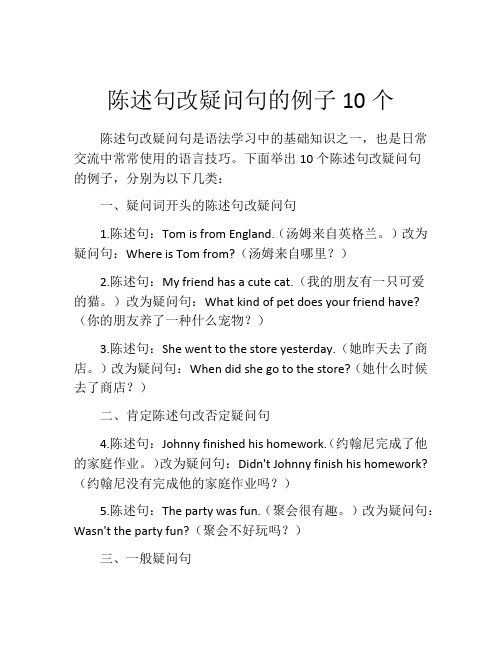
陈述句改疑问句的例子10个陈述句改疑问句是语法学习中的基础知识之一,也是日常交流中常常使用的语言技巧。
下面举出10个陈述句改疑问句的例子,分别为以下几类:一、疑问词开头的陈述句改疑问句1.陈述句:Tom is from England.(汤姆来自英格兰。
)改为疑问句:Where is Tom from?(汤姆来自哪里?)2.陈述句:My friend has a cute cat.(我的朋友有一只可爱的猫。
)改为疑问句:What kind of pet does your friend have?(你的朋友养了一种什么宠物?)3.陈述句:She went to the store yesterday.(她昨天去了商店。
)改为疑问句:When did she go to the store?(她什么时候去了商店?)二、肯定陈述句改否定疑问句4.陈述句:Johnny finished his homework.(约翰尼完成了他的家庭作业。
)改为疑问句:Didn't Johnny finish his homework?(约翰尼没有完成他的家庭作业吗?)5.陈述句:The party was fun.(聚会很有趣。
)改为疑问句:Wasn't the party fun?(聚会不好玩吗?)三、一般疑问句6.陈述句:Sam is coming to the party.(萨姆会来参加聚会。
)改为疑问句:Is Sam coming to the party?(萨姆会来参加聚会吗?)7.陈述句:I like to eat pizza.(我喜欢吃比萨饼。
)改为疑问句:Do you like to eat pizza?(你喜欢吃比萨饼吗?)四、特殊疑问句8.陈述句:She has three brothers.(她有三个兄弟。
)改为疑问句:How many brothers does she have?(她有几个兄弟?)9.陈述句:The movie starts at 8pm.(电影从晚上8点开始。
小学四年级陈述句变特殊疑问句含练习及答案

小学四年级陈述句变特殊疑问句含练习及答案以疑问词开头,对句中某一成分提问的句子叫特殊疑问句.常用的疑问词有:wh at who whose which when where how why等.特殊疑问句有两种语序:1.如疑问词作主语或主语的定语,即对主语或主语的定语提问,其语序是陈述句的语序:疑问词(+主语)+谓语动词+其他成分?如:who is singing in the room﹖whose bike is broken﹖2.如疑问词作其他成分,即对其他成分提问,其语序是:疑问词+一般疑问句语序?如:what class are you in﹖What does she look like﹖Where are you from﹖What time does he get up every morning﹖How do you know﹖特殊疑问词+助动词+主语+动词原形+其他?eg:Where do you do study English?特殊疑问词+be动词+主语+其他?eg:Why is your Mum so angry?特殊疑问词+情态动词+主语+动词原形+其他?eg:What can I do for you?注意:1.回答特殊疑问句时,不能用yes /no,即问什么答什么,尤其是简略回答.如:Who is from Canada﹖Helen (is).Where's the restaurant﹖Near the station.Why do you like koalas﹖Because they are cute.;1.就划线部分提问(变特殊疑问句)This is a book.第一步:变一般疑问句 Is this a book?第二步:找合适的特殊疑问词 Is this what ?第三步:特殊疑问词提前放到句首,并大写,其余按顺序照抄,省略划线部分.What is this?肯定句变特殊疑问句(就划线部分提问):分3步骤第一步:先变一般疑问句第二步:找合适的特殊疑问词代替划线部分第三步:特殊疑问词提前放到句首,并大写,其余按顺序照抄,省略划线部分.2.划线部分不能在特殊疑问句中出现.非单三时用do, 单三时用does肯定句:I like English.否定句:肯定句:He likes English.否定句:就划线部分提问:I like English.第一步:先变一般疑问句 Do you like English?第二步:找合适的特殊疑问词代替划线部分Do you like what?第三步:特殊疑问词提前放到句首,并大写,其余按顺序照抄,省略划线部分. What do you like?特殊;1.some变为any.如:There are some birds in the tree.→There aren't any birds in the tree.但是,若在表示请邀请、请求的句子中,some可以不变.如:Would you like some orange juice?与此相关的一些不定代词如something, somebody等也要进行相应变化.2.and变为or.如:I have a knife and a ruler.→I don't have a knife or a ruler.小学英语特殊疑问句专题练习课堂练习一.划线部分提问.1. He’s Mr. Jones.____________________________________________2. They are on the lake.___________________________________________________________3. I’m twenty-one.__________________________________________4.We are reading an English book.___________________________________________________________5. from China.___________________________________________________________6. Myfather is here.___________________________________________7.Xiao Wang is looking for his teacher.___________________________________________________________8.Mrs. White is Tom’s mother.9. There are thirty people in the room.___________________________________________________________10.The new coat cost 12 yuan.二.选择(who, where, when) 的正确单词填空1._____ is that pretty girl? She is my sister.2._____ are Jack and Tom? They are behind you.3._____ do you go to school? I go to school from Monday to Friday.4._____ has a beautiful flower? John has a beautiful flower.5._____ are they? They are my parents.6._____ is my mother? She is in the living room.7._____ are you going? We are going to the bakery(面包坊).8._____ do Jim and Wendy play ball? They play ball in the afternoon.9._____ does he jog? He jogs in the park.10._____ are you from? I'm from Changchun city.三.用what time, what color, what day, what填空.1. A: ______ _______ is it? B: It is nine o’clock.2. A: ______ _______ does your mother get up?B: My mother gets up at 6:30.3. A: ______ _______ do you go to bed? B: I go to bed at 10:00.4. A: ______ _______ do Diana and Fiona have supper?B: Diana and Fiona have supper at 18:00.5. A: ______ _______is it? B: It is purple.6. A: ______ _______ is the sky? B: The sky is blue.7. A: ______ _______ is your coat? B: My coat is black.8. A: ______ _______ is the dog? B: The dog is white.9. A: ______ _______ is today? B: Today is Monday.10. A: ______ _______ is tomorrow? B: Tomorrow is Tuesday.11. A: ______ _______ was yesterday(昨天)? B: Yesterday was Sunday.12. A: ______ _______ do you like? B: I like red.14. A: ______ are you doing? B: We are playing basketball.15. A: ______ does your mother do? B: My mother is a policewoman.课后练习一、划线部分提问.1. She is my teacher.____________________________________________________2. He buy the red one .____________________________________________________3. It is my coat .____________________________________________________4.I am looking for my sister .____________________________________________________5.I get up at six .____________________________________________________6.I am from Hubei .____________________________________________________7. My bag is red .______________________________________________________8.. The book is Li Hua’s.______________________________________________________9. They are five yuan .______________________________________________________10. It’s a pen.二.选择题( ) 1. ______ is a ticker for the film Hacker He?About forty yuan .A. How oldB. How manyC. How muchD. How often( ) 2. —______ are you going? —I’m going to the library.A. WhoB. WhichC. WhatD. Where( ) 3. —______? —I’ve got a headache and a cough.A. What’s your troubleB. What’s wrong with itC. Can I help youD. How are you( ) 4. ______ tea did you have?Two cups.A. How manyB. How muchC. How soonD. Which( )5. ______?The one behind the tree.A. Whose girlB. Who’s that girlC. Which girlD. Where’s the girl三.从右边选择正确的答案.1. What’s on the chair? A.There is a book in the bag.2. How is your father? B.These are apples.3. What are these? C.I go to school by bus.4. What is in the bag? D.The radio is on the chair.5. How do you go to school? E.My father is fine.6. How much is it? F.I wash my face in the morning.7. What time is it? G.I have two hands.8. When do you wash your face? H.It is four o’clock.9. How many hands do you have? I.It is 5 RMB(人民币).10.When do you have lunch? J.I have lunch at noon.课堂练习答案一.1.Who is he ?2.Where are they ?3.How old are you ?4.What are you doing ?5.Where does she from ?6.Who is here ?7.Who is Xiao Wang looking for ?8.Who is Tom’s mother ?9.How many people are there in the room?10. How much does the coat cost ?二.1-5 Who Where When Who Who6-10 Where Where When Where Where三.1.What time 2.What time 3.What time 4.What time5.What color6.What color7. What color8. What color 9. What day 10. What day11. What day 12. What color 13. What 14. What15. What课后小测答案一.1.Who is she ?2. What does he buy ?3.Whose coat is it ?4. Who are you looking for ?5.What time do you get up ?6.Where are you from ?7.What color is your bag ?8.Whose is the book ?9.How much are they ?10. What is it ?二.C D A B C三.D E B A C I H F G J。
2陈述句变疑问句思路1

Is this his sister? Is that her brother? Are these her parents? Are those his grandparents? Is your name Linda? ___
④Those are his grandparents.(变为一般疑问句)
⑧That box is purple.
⑨My book is on the desk. Is your book on the desk?
⑩The pen is green.
Is the pen green?
(3)答语:Yes, I am.
Yes, he is.
No, I’m not.
No, he isn’t.
⑥Is that a brown box? (肯定回答) Yes, it is. ⑦Is that box purple? (肯定回答) Yes, it is. ⑧Is this a black pen? (肯定回答) Yes, it is. ⑨Is your book on the desk? (肯定回答) Yes, it is. ⑩Is the pen green? (肯定回答) Yes, it is.
考点感悟:
1.陈述句变一般疑问句: (1) 陈述句:陈述一件事情的句子 叫陈述句。 一般疑问句:用Yes或No来回 答的问句叫一般疑问句。
(2) 变化规则:将be动词(am, is, are)提 前,句首字母大写,句末变问号。 注意:在变为问句时,第一人称都要 变成相应的第二人称。如: I am---Are you; We are---Are you;
⑨My book is on the desk.
⑩The pen is green.
陈述句变特殊疑问句的规则及练习
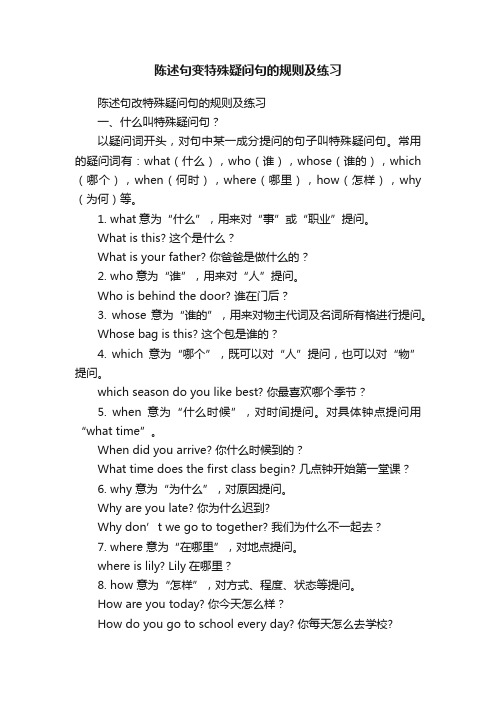
陈述句变特殊疑问句的规则及练习陈述句改特殊疑问句的规则及练习一、什么叫特殊疑问句?以疑问词开头,对句中某一成分提问的句子叫特殊疑问句。
常用的疑问词有:what(什么),who(谁),whose(谁的),which (哪个),when(何时),where(哪里),how(怎样),why (为何)等。
1. what意为“什么”,用来对“事”或“职业”提问。
What is this? 这个是什么?What is your father? 你爸爸是做什么的?2. who意为“谁”,用来对“人”提问。
Who is behind the door? 谁在门后?3. whose意为“谁的”,用来对物主代词及名词所有格进行提问。
Whose bag is this? 这个包是谁的?4. which意为“哪个”,既可以对“人”提问,也可以对“物”提问。
which season do you like best? 你最喜欢哪个季节?5. when意为“什么时候”,对时间提问。
对具体钟点提问用“what time”。
When did you arrive? 你什么时候到的?What time does the first class begin? 几点钟开始第一堂课?6. why 意为“为什么”,对原因提问。
Why are you late? 你为什么迟到?Why don’t we go to together? 我们为什么不一起去?7. where 意为“在哪里”,对地点提问。
where is lily? Lily在哪里?8. how 意为“怎样”,对方式、程度、状态等提问。
How are you today? 你今天怎么样?How do you go to school every day? 你每天怎么去学校?二、陈述句变为特殊疑问句的规则1、在一般疑问句的基础上,句首添加一个疑问词即可,可根据划线部分确定是什么疑问词。
陈述句变特殊疑问句的变形规则

特殊疑问句词总结:
1.what“什么”,对物品提问;对动作提问
2.what color“什么颜色”,对颜色提问
3.where“哪里”,对地点提问
4.what time“什么时间”,对小时间提问
5.when“什么时候”。
对大时间提问
6.what day“星期几”,对星期提问
7.how old“几岁”,对年龄提问
8.how“怎样”,对方式提问
特殊疑问句
特殊疑问句=特殊疑问词+一般疑问句
对动词短语提问用what,动词短语用do代替。
将陈述句变成特殊疑问句!!
对划线部分(动词短语)提问的步骤:
1.将原句变成一般疑问句
2.将一般疑问句中的动词短语(划线部分)替换成do
3.在句首加上特殊疑问词what
例1.I watched TV yesterday.
What did you do yesterday?
例2.She played football last week.
What did she do last week?。
英语陈述句变特殊疑问句

英语陈述句变特殊疑问句Transforming a declarative sentence into a special question sentence involves changing the word order and adding a question word. This type of question is used to gather specific information or to seek clarification on a particular topic. For example, the declarative sentence 'She is going to the store' can be transformed into the special question 'Is she going to the store?' by changing the word order and adding the question word 'is'.The process of transforming a declarative sentence into a special question sentence is relatively straightforward. Firstly, the subject and verb are inverted, with the verb coming before the subject. Additionally, a question word such as'what', 'where', 'why', 'how', 'when', or 'who' is added at the beginning of the sentence to indicate the type of information being sought. This transformation allows for a more interactive and engaging form of communication, as it promptsthe listener to provide a specific response.In addition to the structural changes, special question sentences oftenrequire a rising intonation at the end to indicate that it is a question. This intonation pattern helps to distinguish special question sentences fromdeclarative sentences, signaling to the listener that a response is expected. For example, when asking 'Where are you going?', the rising intonation on the word'going' indicates that the speaker is seeking information rather than making a statement.From a linguistic perspective, special question sentences serve an important function in communication by allowing speakers to gather information, seek clarification, and engage in dialogue. By transforming declarative sentences into special question sentences, speakers can elicit specific details and prompt a more dynamic exchange of information. This interactive nature of special question sentences fosters a deeper level of understanding and facilitates effective communication.Furthermore, special question sentences play a crucial role in language acquisition and development. As individuals learn a new language, they must understand how to form and use special question sentences to effectively communicate and interact with others. By mastering the structure and intonation patterns of special question sentences, language learners can enhance their conversational skills and engage in more meaningful interactions with native speakers.In conclusion, the transformation of declarative sentences into special question sentences is a fundamental aspect of language and communication. By altering the word order, adding question words, and using appropriate intonation, speakers can effectively gather information, seek clarification, and engage in dialogue. From a linguistic perspective, special question sentences serve as a vital tool for interactive communication, while also playing a key role in language acquisition and development. Mastering the use of special question sentences is essential for effective communication and meaningful interactions in any language.。
英语中把陈述句改为一般疑问句和特殊疑问句

将陈述句改为否定句,一般疑问句和特殊疑问句一、将肯定句变为否定句1、谓语动词是be 动词,助动词have, has, will,情态动词can 等时,只要直接在这些词后面加not 就构成否定形式。
eg. Lily has already read this new book. (改为否定句) Lilythis new book.2、谓语动词是行为动词而又没有助动词或情态动词时,必须在谓语动词前加助动词,一般现在时加助动词do ,第三人称单数加does,一般过去时加did,再和not 构成否定结构。
必须指出的是:don't, doesn't, didn't 后都用动词原形。
eg.1)Jill has lunch at school every day. (改为否定句) Jilllunch at school every day.2)T he children had a good time at the party. (改为否定句) Thechildren a good time at the party.3)R ose didn't drink any milk this morning.(改为肯定句) Rosemilk this morning.二、陈述句变一般疑问句A.一般疑问句:以be 动词, have /has/do 等助动词、can/may 等情态动词开头,以yes 或no 来回答的问句。
它的基本结构是:Be/Have /Has/Did 等助动词(包括情态动词)+主语+谓语+┄?回答常用简略回答。
1、谓语动词是be 动词、助动词、情态动词时,只要直接把这些词置于句首,句末改成问号。
eg. There's something wrong with his bike.(改成疑问句)wrong with his bike?2、谓语动词是行为动词时,必须在句首加上助动词Do、Does(三单)、Did(过去式)加上这些助动词后,句子中谓语动词必须用原形。
英语中如何将陈述句变成特殊疑问句

英语中如何将陈述句变成特殊疑问句如何将陈述句变成特殊疑问句?一、什么叫特殊疑问句?以疑问词开头,对句中某一成分提问的句子叫特殊疑问句。
常用的疑问词有:what who whose which when where how why 等。
二、特殊疑问句有两种语序:1.疑问词作主语如疑问词作主语或主语的定语,即对主语或主语的定语提问,其语序是陈述句的语序:疑问词(+主语)+谓语动词+其他成分?如:who is singing in the room﹖whose bike is broken﹖2.疑问词作其他成分如疑问词作其他成分,即对其他成分提问,其语序是:疑问词+一般疑问句语序?如:what class are you in﹖What does she look like﹖Where are you from﹖What time does he get up every morning﹖How do you know﹖①特殊疑问词+助动词+主语+动词原形+其他?eg: Where do you do study English?②特殊疑问词+be动词+主语+其他?eg: Why is your Mum so angry?③特殊疑问词+情态动词+主语+动词原形+其他?eg: What can I do for you?注意:1.回答特殊疑问句时,不能用yes / no,即问什么答什么,尤其是简略回答。
如:Who is from Canada﹖Helen (is).Where's the restaurant﹖Near the station.Why do you like koalas﹖Because they are cute.特殊疑问句解题技巧:1、肯定句变特殊疑问句(就划线部分提问):分3步骤第一步:先变一般疑问句第二步:找合适的特殊疑问词代替划线部分第三步:特殊疑问词提前放到句首,并大写,其余按顺序照抄,省略划线部分。
陈述句、疑问句等句型转换和练习(大量)

句型转换一、肯定句变否定句:1、在be动词后加not。
如:is not ,are not ,am not,was not,were not;2、在情态动词can,should,will等后加not。
如:cannot,should not,will not;3、既有be动词又有情态动词,在情态动词后加not。
如:There won’t be a meeting.4、上述都没有的,在动词前加助动词否定形式don’t/doesn’t/didn’t。
特殊情况:1. 如果肯定句中有连词and ,变为否定句时,通常要将and 变为or 。
例如:The girl can sing and dance. → The girl cannot sing or dance.2. 如果肯定句中some ,变为否定句时,some 一般要改为any 。
例如:There are some boys in the room. → There are not any boys in the room.3. 如果肯定句中有too (也),变为否定句时,应将too 改为either 。
例如:Wang Ling is a teacher, too. → Wang Ling is not a teacher, either.4. 如果肯定句中有already ,变为否定句时,应将already 改为yet ,并放在句末。
例如:The worker has finished his work already. → The worker has not finished his work yet.5. 如果肯定句中有“ had better ”,变为否定句时,not 要放在“ had better ”之后。
例如:You had better write to your teacher. → You had better not write to your teacher.6. 如果肯定句中有always ,变为否定句时,要将always 改为never 。
陈述句变特殊疑问句的步骤

第一单元语法知识总结●陈述句变特殊疑问句的步骤一、先审题,确定要提问什么内容,然后选择相应的特殊疑问词;(提问人用who,提问地点用where,提问时间用when,提问事,物体时用what,提问年龄用how old, 提问颜色用what color……);二、在原来陈述句中找是否有系动词am, is, are;或情态动词can,must等:1.如果有系动词或情态动词,就将其提前并放在特殊疑问词后。
当然如果我们找到的系动词是am那么我们需要根据情况把am变为are, 将主语I 变为you)。
2.如果陈述句中既没有系动词也没情态动词,那么我们要借助助动词do, does, (主语为单三人称需用does, 其余人称均用do,如果疑问词用does时,动词需还为原形);三、将陈述句中的主语及其他成分照抄过来(抄人称时需注意将第一人称需转换为第二人称)。
四、句末加问号。
(学好本节知识,大家在做就划线部分提问一类提示将会有很大的帮助,但大家在变换的过程中需注意不能将陈述句中所划线的内容出现在特殊疑问句中。
如:It is yellow.—What color is it yellow?( )What color is it?()●例题示范He is a nice man.----- Who is a nice man?His favorite color is red. ----What is his favorite color?She likes pink best. ----What color does she like best?My father always goes to America by plane.---- How does your father go to America?练兵场-----就划线部分提问1.I am 10 years old.2.My mother likes rabbit(兔子).3.Lily comes from Canada.4.They go to school at 6:30 every morning.5.Sarah often read books on Saturday.6.We often go to Bei Jing for holiday(去度假)。
译林版小学四年级陈述句变特殊疑问句练习及答案
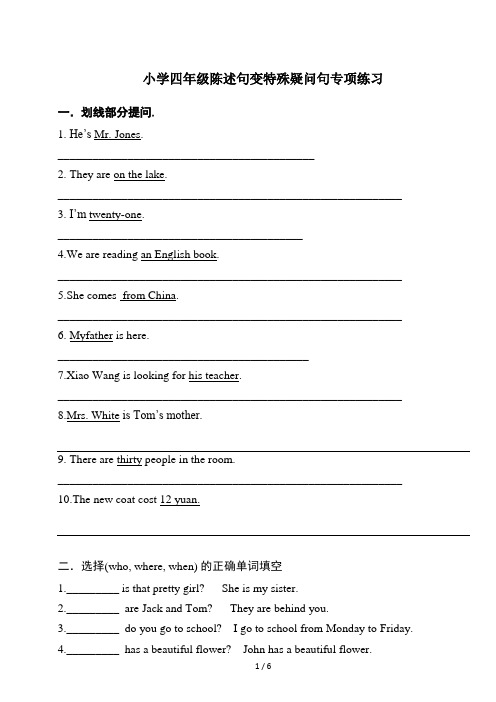
小学四年级陈述句变特殊疑问句专项练习一.划线部分提问.1. He’s Mr. Jones.____________________________________________2. They are on the lake.___________________________________________________________ 3. I’m twenty-one.__________________________________________4.We are reading an English book.___________________________________________________________ 5.She comes from China.___________________________________________________________ 6. Myfather is here.___________________________________________7.Xiao Wang is looking for his teacher.___________________________________________________________ 8.Mrs. White is Tom’s mother.9. There are thirty people in the room.___________________________________________________________ 10.The new coat cost 12 yuan.二.选择(who, where, when) 的正确单词填空1._________ is that pretty girl? She is my sister.2._________ are Jack and Tom? They are behind you.3._________ do you go to school? I go to school from Monday to Friday.4._________ has a beautiful flower? John has a beautiful flower.5._________ are they? They are my parents.6._________ is my mother? She is in the living room.7._________ are you going? We are going to the bakery(面包坊).8._________ do Jim and Wendy play ball? They play ball in the afternoon.9._________ does he jog? He jogs in the park.10._________ are you from? I'm from Changchun city.三.用what time, what color, what day, what填空.1. A: __________ __________ is it? B: It is nine o’clock.2. A: __________ __________ does your mother get up?B: My mother gets up at 6:30.3. A: __________ __________ do you go to bed? B: I go to bed at 10:00.4. A: __________ __________ do Diana and Fiona have supper?B: Diana and Fiona have supper at 18:00.5. A: __________ __________ is it? B: It is purple.6. A:__________ __________ is the sky? B: The sky is blue.7. A: __________ __________ is your coat? B: My coat is black.8. A: __________ __________ is the dog? B: The dog is white.9. A: __________ __________ is today? B: Today is Monday.10. A: __________ __________ is tomorrow? B: Tomorrow is Tuesday.11. A: __________ __________ was yesterday(昨天)? B: Yesterday was Sunday.12. A: __________ __________ do you like? B: I like red.14. A: __________ are you doing?B: We are playing basketball.15.A: __________ does your mother do?B: My mother is a policewoman.小学四年级陈述句变特殊疑问句课后练习一、划线部分提问(40分).1. She is my teacher.____________________________________________________ 2. He buy the red one .____________________________________________________ 3. It is my coat .____________________________________________________ 4.I am looking for my sister .____________________________________________________ 5.I get up at six .____________________________________________________ 6.I am from Hubei .____________________________________________________ 7. My bag is red .______________________________________________________ 8.. The book is Li Hua’s.______________________________________________________ 9. They are five yuan .______________________________________________________ 10. It’s a pen.二.选择题(20分)( ) 1. ——______ is a ticker for the film ?——About forty yuan .A. How oldB. How manyC. How muchD. How often( ) 2. —______ are you going? —I’m going to the library.A. WhoB. WhichC. WhatD. Where( ) 3. —______? —I’ve got a headache and a cough.A. What’s your troubleB. What’s wrong with itC. Can I help youD. How are you( ) 4. ——______ tea did you have?——Two cups.A. How manyB. How muchC. How soonD. Which( )5. ——______?——The one behind the tree.A.Whose girlB. Who’s that girlC. Which girlD. Where’s the girl三.从右边选择正确的答案(40分).1. What’s on the chair?() A. There is a book in the bag.2. How is your father? () B. These are apples.3. What are these? () C. I go to school by bus.4. What is in the bag? () D. The radio is on the chair.5. How do you go to school? () E. My father is fine.6. How much is it? () F. I wash my face in the morning.7. What time is it? () G. I have two hands.8. When do you wash your face?()H. It is four o’clock.9. How many hands do you have? () I. It is 5 RMB(人民币).10.When do you have lunch? () J. I have lunch at noon.课堂练习答案一.1.Who is he ?2.Where are they ?3.How old are you ?4.What are you doing ?5.Where does she from ?6.Who is here ?7.Who is Xiao Wang looking for ?8.Who is Tom’s mother ?9.How many people are there in the room?10. How much does the coat cost ?二.1-5 Who Where When Who Who6-10 Where Where When Where Where三.1.What time 2.What time 3.What time 4.What time 5.What color 6.What color 7. What color8. What color 9. What day 10. What day11. What day 12. What color 13. What 14. What15. What课后小测答案一.1.Who is she ?2. What does he buy ?3.Whose coat is it ?4. Who are you looking for ?5.What time do you get up ?6.Where are you from ?7.What color is your bag ?8.Whose is the book ?9.How much are they ?10. What is it ?二.C D A B C三.D E B A C I H F G J。
- 1、下载文档前请自行甄别文档内容的完整性,平台不提供额外的编辑、内容补充、找答案等附加服务。
- 2、"仅部分预览"的文档,不可在线预览部分如存在完整性等问题,可反馈申请退款(可完整预览的文档不适用该条件!)。
- 3、如文档侵犯您的权益,请联系客服反馈,我们会尽快为您处理(人工客服工作时间:9:00-18:30)。
陈述句变特殊疑问句
【篇一:陈述句变特殊疑问句】
以疑问词开头,对句中某一成分提问的句子叫特殊疑问句。
常用的
疑问词有:whatwho whose which when where how why等。
二、特殊疑问句有两种语序:
1.疑问词作主语
如疑问词作主语或主语的定语,即对主语或主语的定语提问,其语
序是陈述句的语序:疑问词(+主语)+谓语动词+其他成分?如: who issinging in the room?
whosebike is broken?
2.疑问词作其他成分
如疑问词作其他成分,即对其他成分提问,其语序是:疑问词+一
般疑问句语序?如:
whatclass are you in?
what doesshe look like?
where areyou from?
what timedoes he get up every morning?
how doyou know?
1.回答特殊疑问句时,不能用yes / no,即问什么答什么,尤其
是简略回答。
如:
who is from canada?
helen (is).
wheres the restaurant?
near the station.
why do you like koalas?
because they are cute.
特殊疑问句解题技巧:
1、肯定句变特殊疑问句(就划线部分提问):分3步骤
第一步:先变一般疑问句
第二步:找合适的特殊疑问词代替划线部分
第三步:特殊疑问词提前放到句首,并大写,其余按顺序照抄,省
略划线部分。
注意:1.一定先变一般疑问句。
但如果问的是主语或主语的定语时,语序不变。
2.划线部分不能在特殊疑问句中出现。
